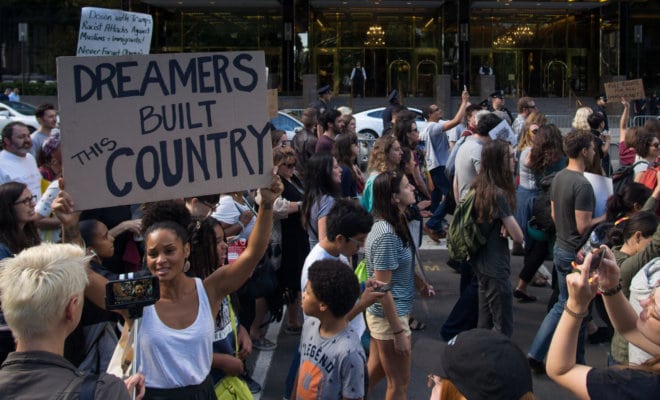Immigration
Immigrants Fear U.S. Census Data Can be Used Against Them

Rally against the rescission of Deferred Action For Childhood Arrivals (DACA) in New York City on September 9, 2017.
Photo: Wikimedia Commons
Census Bureau officials are concerned that falsified data would affect the accuracy of the figures.
Census Bureau officials in the United States have another reason to worry, besides the extra $3.3 billion needed, to complete the 2020 census. Many immigrants are now worried that the information provided by them to census survey workers will be used to deport them.
Government officials worry that the withholding of data would affect the accuracy of the 2020 census. The United States conducts decennial census survey to gauge demographic indices. The accuracy of the information affects how districts are divided, and the funds given to them, and seats allocated in the Congress to states.
An “unprecedented ground swell in confidentiality and data-sharing concerns among immigrants or those who live with immigrants” has been observed, Mikelyn Meyers, a researcher at the Census Bureau’s Center for Survey Measurement, said at a meeting of the bureau’s National Advisory Committee, Reuters reported. Her presentation on Respondent Confidentiality Concerns and Possible Effects on Response Rates and Data Quality for the 2020 Census is posted online.
Many responders had the perception that certain immigrant groups are unwelcome. She also said that there was an increase in rate of unusual respondent behaviors during pre-testing and production surveys (data falsification, item non-response, break-offs). The pre-testing was done between February and September 2017.
The pretested groups received a cash incentive, were recruited through trusted community organizations, with the researcher sitting next to them during the survey. They also explain confidentiality during informed consent.
According to Meyers, people gave false dates of birth, reported less number of people living in the house, false names, tried to stop the interview or seemed visibly nervous.
“The possibility that the Census could give my information to internal security and immigration could come and arrest me for not having documents terrifies me,” one respondent said.
Latinos and Muslims seem to be equally fearful of deportation, the presentation indicates. This makes apparent the effect of the “Muslim Ban” — U.S. President Donald Trump’s executive order for stopping immigration from seven countries with Muslim majority population — and the end of the Deferred Action for Childhood Arrivals (DACA) program that is likely to affect many Latinos who had come to the country illegally as children.
Top technology companies have been campaigning for the government to continue with DACA as hundreds of workers employed by them and other places may face deportation come March 2018. End of DACA affects the fate of more than 17,000 Indians living in the United States. While there are 17,000 DACA enrolled Indians, there are 5,500 Indians and Pakistanis whose application is still in process. They could all face deportation in March 2018.
The Census Bureau is planning to hire surveyors from the local community to improve trust.



